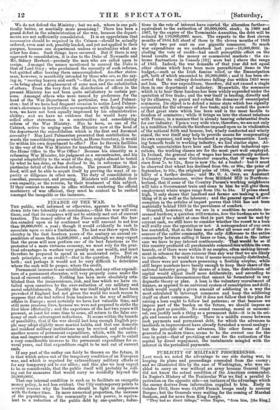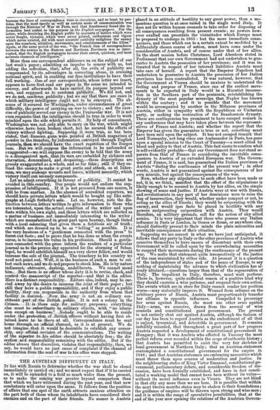PUBLICITY OF MILITARY PROCEEDINGS.
LAST week we noted the advantage to one side during war, in keeping its plans and proceedings concealed from the enemy; and we illustrated this by the ease of Washington, who was en- abled to carry on war' without an army because General Gage did not know the actual condition of the American commander. In Napier's History of the Peninsular War we find a parallel il- lustration on the opposite side-:--an instance of the advantage which the enemy derives from information supplied to him. Early in October 1812, there were 44,000 French troops ready to succour Burgos ; but the Generals were waiting for the coming of Marshal Bonham, and for news from King Joseph. "They had no direct tidings," writes Napier, "from him, [the King,] because the lines of correspondente were so circuitous, and so beset by par- tidos, that the most speedy as well as certain mode of communication was through the Minister of War at Paris, and that functionary found the in- formation best suited to his purpose in the English newspapers. For the latter, while deceiving the English public by accounts of battles which were never fought, victories which were never gained,. enthusiasm and vigour which never existed, did with most accurate assiduity enlighten the enemy upon the numbers, situation, movements, and reinforcements of the Allies." Again, at the same period of the war, "the French line of correspondence between the armies in the Eastern and Northern Provinces was so inter- rupted, that the English newspapers became their surest, quickest, and most accurate channels of intelligence."
More than one correspondent addresses us on the subject of our last week's paper ; admitting an impulse to concur with us, but adding the reflection, that, after all, the evils of publicity are compensated by its advantages in correcting abuse, in arousing national spirit, and in enabling our free institutions to have their full working. One of our correspondents, whose letter we insert, appears to have first read our paper in the sense we intended to convey, and afterwards to have carried its purpose beyond our own, and snpposed us to condemn publicity. We did not, and we do not, condemn publicity; but we say that there are cases in which military intelligence ought not to be conveyed. The ab- sence of it secured for Washington, under circumstances of great difficulty, the power of parrying on war to victory ; and the exer- cise of publicity served our enemy in the Peninsular war. It is not even requisite thnt the intelligence should be true in order to work mischief upon the side which permits it. By help of concealment, Washington was; net enly ahle to carry on the war, which might otherwise have. been broken, short, but he secured the effects of victory without fighting,. Supposing it were true, as has been stated, that Ituasian guns were pointed at British magazines of powder in the trenches, byinformation conveyed through English Journals, then We.sheuld have the exact repetition of the Burgos case. But we will ,suppose the information to be unfounded or exaggerated—we _will suppose the enemy to be told that the army is a disorganized mob, -that its men are enfeebled by sickness and starvation, demoralized, and despairioag,—these_ descriptions are grossly exaggerated as a whole, and so far false ; still if they en- ticed the. enemy to make a zreat sortie and attack, as at Inker- man, we may undergo wounds-and losses, without necessity, which -victory itself can 'scarcely compensate. Let us admit everythinc.° in favour of publicity. It cannot be avoided in this country. Our people would not endure the sup- pression of intelligence. If it is not procured from one source, it will be from another. In the absence of accredited reporters, we should.have private letters which would be bought up like auto- graphs at Leigh Sotheby's sale. Let us, however, note the dis- tinction between letters written to give information to those who are interested, upon the actnal condition of the writer and upon facts within his own sight, and those letters which are collected as a matter of business not immediately interesting to the writer ; which are manulaotured in great part upon hearsay, though tinted with a local oolouring that gives them a fictitious air of truth; and which are dressed up to be as " telling " as possible. It is the very business of a "gentleman connected with the press" to ferret out facts ; and to prove that he has done so when the events occur, is to increase his value in his profession. Should a gentle- man connected with the press inform the readers of a particular journal as to the precise day appointed for the storming of Sebas- topol, he would establish himself as a very clever fellow, and would increase the sale of the journaL The treachery to his country we need not point out. Well, it is the business of such a man to col- lect such news, and we do not propose to check him. He is by nature indiscreet, obtrusive, dashing, undeliberate. We cannot mend
But there is an officer whose duty it is to revise, check, and control the manuscript of the reporter—and that is the editor. Here is a distinct responsibility. Editors also, indeed, may be car- ried away by the desire to increase the éclat of their paper ; but still they have public responsibility, and if they enjoy a public facility, they are responsible to the authority from whom that facility is derived. Now the army is not an ordinary con- stituent part of the British public. It is not a colony in the Crimea. It is 'there only for military purposes; everything else must be subordinate to military objects, with "no admis- sion except on business." Nobody ought to be able to reside under the protection. of British officers without having first ob- tained leav.e to- be there at all. Correspondence must be sent home through an official channel, as it is at present. We do not imagine 'that it would be desirable to establish any censor- ship, any official revision of the communications. The writing of the reporter to his editor should be absolutely free ; the dis- cretion and responsibility remaining with the editor. But if the editor abuses that discretion, violates that responsibility, then we say, he would have no just cause of complaint if the channel of information from the seat of war to his office were stopped.







































 Previous page
Previous page